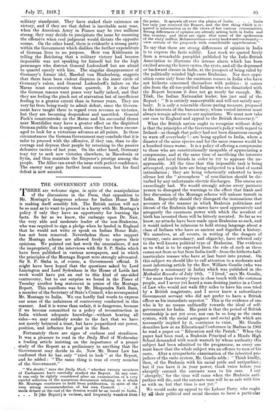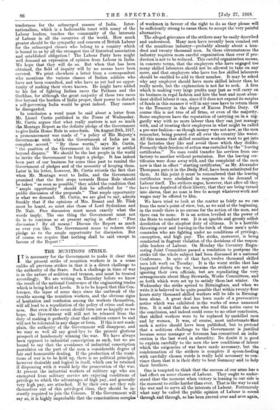THE GOVERNMENT AND INDIA. T HERE are welcome signs, in spite
of the manipulation of the discussions in the Press, that opposition to Mr. Montagu's dangerous scheme for Indian Home Rule is making itself sensibly felt. The British nation will not be so mad as to want to proceed in a hurry with Mr. Montagu's policy if only they have an opportunity for learning the facts. So far as we know, the embargo upon Dr. Nair, the very able and moderate leader of the non-Brahmins, who was required to sign a pledge when he landed in England that he would not write or speak on Indian Home Rule, has not been removed. Nevertheless those who support the Montagu scheme are allowed freely to express their opinions. We pointed out last week the unusualness, if not the impropriety, of the interviews with Sir S. P. Sinha which have been published in various newspapers, and in which the principles of the Montagu Report were strongly advocated. Sir S. P. Sinha is, of course, a Government official. It might have been hoped that the questions asked by Lord Lamington and Lord Sydenham in the House of Lords last week would have put an end to this kind of one-sided controversy, but to our surprise we found in the Times of Tuesday another long statement in praise of the Montagu Report. This manifesto was by Mr. Bhupendra Nash Basu, a member of the Secretary of State's Council, who accompanied Mr. Montagu to India. We can hardly find words to express our sense of the unfairness of controversy conducted in this manner. And it is worse than unfair, it is dangerous, because if we become committed to a policy of reconstruction in India without adequate knowledge—without hearing all sides—we may suddenly awake to the fact that we °have not merely betrayed a trust, but have jeopardized our power, position, and influence for good in the East.
• Fortunately there are signs of coolness and steadiness. It was a pleasure to read in the Daily Mail of Wednesday a leading article insisting on the importance of a proper study of the Report as a preliminary to anything that the Government may decide to do. Now Mr. Boner Law has confessed that he has only "tried to look" at the Report, and he added : "The same thing is true of every member of the Government." _ "We doubt," says the Daily Mail, "whether twenty members of Parliament have carefully studied the Report. In any case, it can only be rightly considered after an examination of a very careful selection of the numerous documents relating to it which Mr. Montagu continues to hold from publication, in spite of the very strong recommendation of his own Council. . . . A mock debate at the end of the Session would be an insult to India. . . . It [the Report] is verbose, and frequently wanders from
the point. It sprawls all over the plains of India. . . . India has only just received the Report, and the first thing which is re- quired is information as to the views of her various communities. Strong differences of opinion are already arising both in India and this country, and there are signs that some of the spokesmen of the sixty million Mohammedans—a very backward community— view certain of the proposals with considerable apprehension.'
To say that there are strong differences of opinion in India is to express the facts mildly. Last week we quoted freely from a remarkable pamphlet published by the Indo-British Association to illustrate the intense alarm which has been excited among the lower castes, the ryots, and all the depressed or backward classes in India, at the prospect of being ruled by the politically minded high-caste Brahmins. Nor does oppo- sition come only from the enormous masses in India who have not hitherto concerned themselves with politics : it comes also from the all-too-political Indians who are dissatisfied with the Report because it does not go nearly far enough. Mr. Tilak, the Indian Nationalist leader, has just said of the Report : "It is entirely unacceptable and will not satisfy any- body. It is only a miserable cheese-paring measure, proposed in the interests of the bureaucracy, whose vested interest must always remain adverse to our aspirations. We must now take our case to England and appeal to the British democracy."
What the British nation ought to recognize without delay is that the principles of the Government's policy with regard to Ireland—as though that policy had not been disastrous enough to warn off everybody !—are being applied to India, where a disaster of the same species and for the same reasons would be a hundred times worse. It is a policy of offering a compromise to those who are constitutionally incapable of appreciating a compromise, and at the same time of sacrificing the interests of firm and loyal friends in order to try to appease the un- appeasable. All the time that this impossible task is being attempted, people here are being subjected to a kind of moral intimidation ; they are being vehemently exhorted to keep silence lest the " atmosphere ' of conciliation should be dis- turbed by any unfortunate electric discharges. The omens are exceedingly bad. We would strongly advise every patriotic person to disregard the warnings to the effect that frank and free discussion of the Montagu scheme will unloose tumult in India. Especially should they disregard the insinuations that accounts of the manner in which Brahmin politicians and literati of the Brahmin high castes have used oppressively and arrogantly the enormous power with which the accident of birth has invested them will be bitterly resented. So far as we know, no attacks have been made upon Brahmins as such, and it would indeed be infamous to hold strong language about a class of Indians who have so ancient and dignified a history. We ourselves, at all events, in writing of the dangers of tyranny, caste ascendancy, and oligarchy, have referred only to the well-known political type of Brahmins. The evidence as to what is to be expected from the rule of such as these comes not from us but from India itself—from the hitherto half- inarticulate masses who have at last burst into protest. On this subject we should like to call attention to a moderate and most informing article by the Rev. William Goudie (who was formerly a missionary in India) which was published in the Methodist Recorder of July 18th. "I lived," says Mr. Goudie, "for more than twenty years in close touch with the common people, and I never yet heard a man desiring justice in a Court of Law who would not walk fifty miles to have his case tried by a British magistrate, and I never knew a subordinate Government servant who did not prefer to have a British officer as his immediate superior." This is the evidence of one who is by no moans unfriendly towards the ideal of self- government for India. His point is that the period of British trusteeship is not yet over, nor can be so long as the caste system, with the social arrogance and social gulfs which are necessarily implied by it, continues to exist. Mr. Goudie describes how at an Educational Conference in Madras in 1901 he read a paper on "Education and the Pariah." When the paper had been read, a Brahmin Principal of a Hindu High School demanded with much warmth by whose authority this subject had been admitted to the programme, as every one must know that the whole subject was an offence to men of his caste. After a sympathetic examination of the inherited pre- judices of the caste system, Mr. Goudie adds : "Think kindly, then, of the Brahmin with his racial pride and antipathies ; but if you have it in your power, think twice before you abruptly commit the outcaste man to his care. I say 'abruptly,' for the time will come when the Brahmin anti- pathies will die, and the outcaste man will be as safe with him as with us, but that time is not yet."
We would make ap appeal to the Labour Party, who ought by all their political and social theories to have a particular tenderness for the submerged masses of India. Inter- nationalism, which is a fashionable tenet with many of the Labour leaders, teaches the community of the interests of Labour in all the countries of the world. How much greater should be the sympathy and concern of British Labour for the submerged classes who belong to a country which is bound to us by all the strongest ties of historical association and established obligation ! The Labour Party here might well demand an expression of opinion from Labour in India. We hope that they will do so. But when that has been obtained, the field of inquiry will by no means have been covered. We print elsewhere a letter from a correspondent who mentions the various classes of Indian soldiers who have not been consulted, and who have as yet had no oppor- tunity of making their views known. He might have added to his list of fighting Indian races the Pathans and the Gurkhas, for although the greet majority of these two races live beyond the borders of India proper, their power to disturb a self-governing India would be great indeed. They cannot be disregarded. • In conclusion a word must be said about a letter from Mr. Lionel Curtis published in the Times of Wednesday. Mr. Curtis argues that what really matters is not so much the Montagu Report as the definite pledge of the Government to give India Home Rule in some form. On August 20th,1917, a pronouncement was made of "a policy of His Majesty's Government with which the Government of India are in complete accord." "By these words," says Mr. Curtis, "the position of the Government in this matter is settled beyond dispute." We should be the last people in the world to invite the Government to forget a pledge. It has indeed been part of our business for some time past to remind the Government of pledges and of the necessity of keeping them. Later in his letter, however, Mr. Curtis records the fact that when Mr. Montagu went to India, and the Government promised that the first steps towards Home Rule should be taken "as soon as possible," they added the condition that "ample opportunity " should first be afforded for "the public discussion of the proposals." That ample opportunity is what we demand. Mr. Curtis, we are glad to say, admits frankly that if the opinions of Mrs. Besant and Mr. Tilak must be heard, so must also those of Lord Sydenham and Dr. Nair. Free discussion must mean exactly what the words imply. The one thing the Government must not do is to continue as at present saying in effect : "Free discussion ? By all means I Discuss the Report as much as ever you like. The Government mean to redeem their pledge as to the ample opportunity for discussion. But of course we require that nothing shall be said except in favour of the Report ! "



































 Previous page
Previous page